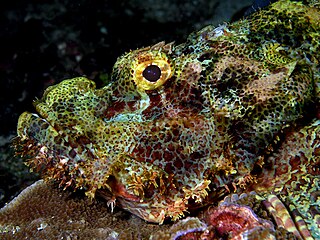
The Scorpaenidae are a family of mostly marine fish that includes many of the world's most venomous species. As their name suggests, scorpionfish have a type of "sting" in the form of sharp spines coated with venomous mucus. The family is a large one, with hundreds of members. They are widespread in tropical and temperate seas but mostly found in the Indo-Pacific. They should not be confused with the cabezones, of the genus Scorpaenichthys, which belong to a separate, though related, family, Cottidae.

The gastric glands are glands in the lining of the stomach that play an essential role in the process of digestion. All of the glands have mucus-secreting foveolar cells. Mucus lines the entire stomach, and protects the stomach lining from the effects of hydrochloric acid released from other cells in the glands.

Helicidae is a large, diverse family of small to large, air-breathing land snails, sometimes called the "typical snails."

Vertiginidae, common name the whorl snails, is a family of minute, air-breathing land snails, terrestrial pulmonate gastropod molluscs or micromollusks in the superfamily Pupilloidea.
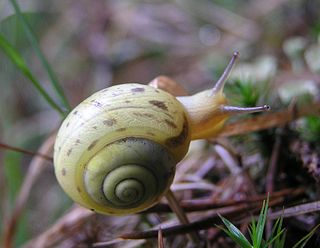
Bradybaeninae is a taxonomic subfamily of medium-sized to small land snails, terrestrial pulmonate gastropod mollusks in the family Camaenidae, superfamily Helicoidea.

Helicoidea is a taxonomic superfamily of air-breathing land snails, terrestrial pulmonate gastropod mollusks in the clade Stylommatophora.

Clausiliidae, also known by the common name door snails, is a taxonomic family of small, very elongate, mostly left-handed, air-breathing land snails, sinistral terrestrial pulmonate gastropod mollusks.
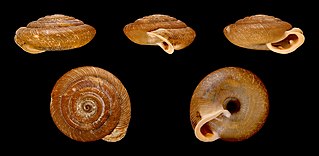
Oestophora is a genus of air-breathing land snail, a terrestrial gastropod mollusk in the family Trissexodontidae.
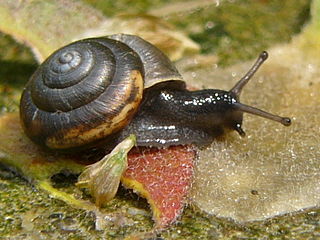
Hygromiidae is a taxonomic family of small to medium-sized air-breathing land snails, terrestrial pulmonate gastropod mollusks in the superfamily Helicoidea.
Submucosal glands can refer to various racemose exocrine glands of the mucous type. These glands secrete mucus to facilitate the movement of particles along the body's various tubes, such as the throat and intestines. The mucosa is the lining of the tubes, like a kind of skin. Submucosal means that the actual gland resides in the connecting tissue below the mucosa. The submucosa is the tissue that connects the mucosa to the muscle outside the tube.
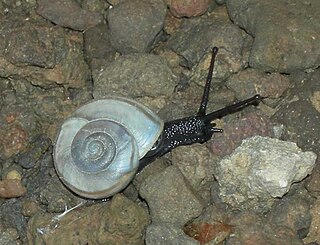
The Helminthoglyptinae are a subfamily of air-breathing land snails, terrestrial pulmonate gastropod mollusks within the family Xanthonychidae.
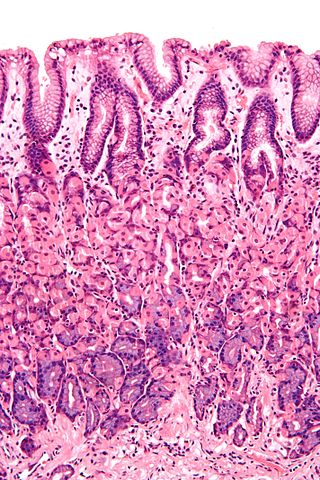
Foveolar cells or surface mucouscells are mucus-producing cells which cover the inside of the stomach, protecting it from the corrosive nature of gastric acid. These cells line the gastric mucosa. The mucus-secreting cells of the stomach can be distinguished histologically from the intestinal goblet cells, another type of mucus-secreting cell.
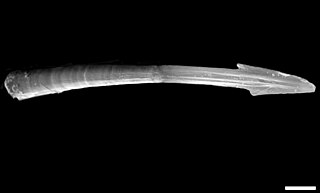
A love dart is a sharp, calcareous or chitinous dart which some hermaphroditic land snails and slugs create. Love darts are both formed and stored internally in a dart sac. These darts are made in sexually mature animals only, and are used as part of the sequence of events during courtship, before actual mating takes place. Darts are quite large compared to the size of the animal: in the case of the semi-slug genus Parmarion, the length of a dart can be up to one fifth that of the semi-slug's foot.

Xanthonychidae is a family of air-breathing land snails, terrestrial pulmonate gastropod mollusks in the superfamily Helicoidea.

Monadeniinae is a taxonomic subfamily of small to medium-sized air-breathing land snails, terrestrial pulmonate gastropod mollusks in the family Xanthonychidae
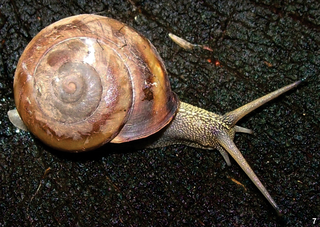
Epiphragmophorinae is a subfamily of air-breathing land snails, terrestrial pulmonate gastropod mollusks in the family Xanthonychidae. This family has no subfamilies.

Cepolidae is a family of air-breathing land snails, terrestrial pulmonate gastropod mollusks in the superfamily Helicoidea.

The reproductive system of gastropods varies greatly from one group to another within this very large and diverse taxonomic class of animals. Their reproductive strategies also vary greatly, see Mating of gastropods.
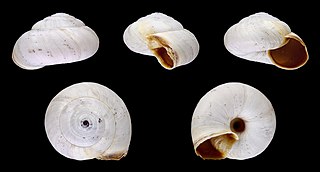
Xeropicta is a genus of small air-breathing land snails, pulmonate gastropod mollusks in the subfamily Helicellinae of the family Geomitridae, the hairy snails and their allies.

Geomitridae is a taxonomic family of small to medium-sized air-breathing land snails, terrestrial pulmonate gastropod mollusks in the superfamily Helicoidea.


















